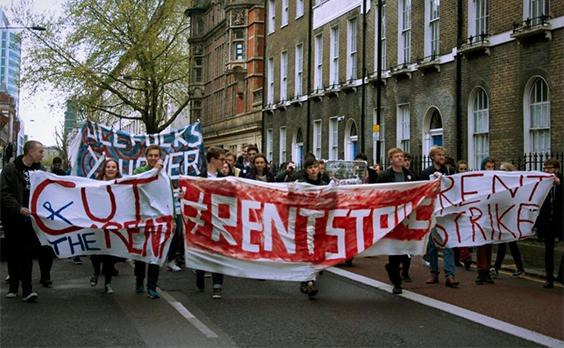The UCL rent strike was a success – but what happens when these students leave university?
The rent I’ve paid in London since I left UCL has steadily increased by around £80 per month. I’ve lived on people’s floors and sofas, inside a friend’s airing cupboard and in a condemned property without glass in the windows


£12,468: that’s how much people in London pay per square foot for their properties. To put that in perspective, the second most expensive capital city in Europe after London is Paris, coming in at £6,010 per square foot – an incongruous jump down, before prices start to tumble all the way down with Stockholm (£5,844), Rome (£5,201), Luxembourg City (£4,930) and Vienna (£4,259) towards the top of the price range and Riga (£1,101), Budapest (£940), Bucharest (£889) and Sofia (£734) at the bottom. The distance between Sofia and London is 2,486km – but those prices make it feel a hell of a lot further.
If you think buying property is a drag, though, renting is even worse. Fancy signing your freedom away for double what most people pay to service a mortgage? Try getting a flat in central. Bonuses include: landlords who enter your property to snoop through your belongings while you’re at work (legal, so long as they send you an email the day before saying they’re “cleaning the shower head”); unexpected evictions; unsafe electrics; unreturned deposits and extortionate letting agent fees.
Once you’ve bought into this scam, you can listen to older people telling you that everybody rents in Europe and what we really need is a change in mentality.
It doesn’t matter that renting is completely different in the majority of mainland Europe – most people stay in their rented accommodation long-term, are respected by their landlords and pay less than half the amount British tenants are expected to stump up. And it doesn’t matter that most of the people telling you to broaden your mind own a flat in London, a holiday home in Cornwall and a “rural getaway” in the South of France. What you need is a change in mentality.
So I had mixed feelings over the success of the rent strikers’ campaign at University College London this week. UCL students have been refusing to pay their rent ever since their halls of residence started demanding extortionate sums for often abysmal accommodation. And I can vouch for that, because I went to UCL and lived for a year in a room that made my hard-as-nails mother cry on sight.
Of course I’m very happy for the rent strikers, and I’m impressed that direct action eventually achieved their goals. But I wonder what happens when they enter second year of university and leave the (dubious) comfort of halls, or graduate and leave university. How can they hold the corrupt and fundamentally unfair property market to account then, when everything becomes more complicated?
Sian Berry’s successful efforts this week to convince new Mayor of London Sadiq Khan that he should calculate a “living rent” for London as a yardstick for what’s reasonable in the capital does give me hope that at least some of the more colourful ads on Gumtree (“tent in my kitchen, Bethnal Green, for just £500pcm”) might finally be weeded out. Whether that translates into long-term change is too early to tell – but the UCL rent strikers’ win does suggest that the tide is beginning to turn.
The rent I’ve paid in London since I left UCL has steadily increased by around £80 per month each year, even though properties I’ve lived in are much the same in terms of space and quality. I’ve lived on people’s floors and sofas, inside a friend’s airing cupboard and in a condemned property without glass in the windows – all while working full time.
I’ve had a six-week deposit of more than £1,000 stolen by a landlord who refused to return it because a couple of lightbulbs needed replacing after I moved out. I’ve been fined £100 by a property management company for leaving a cardboard box in my own hallway. I’ve been served notice because the landlord wanted to move their children in to the house I was living in instead, because – ironically enough – they would never be able to afford to rent a place of their own in London. And I’ve spent hours on the phone with Shelter and the Citizens Advice Bureau in my lunch breaks only to be told that, even though I’m legally in the right, there is no way for tenants to win a fight against a landlord in the current system and it’s better just to cut and run.
When my friends and I were evicted from a house we’d lived in and loved for three years, we pleaded with the landlord and his family that we needed a bit more time (we were given a week) to gather our effects. “This is our home,” we explained, “and it’s the only home we have.” They just looked at us blankly and said: “This is our house. We bought it.”
That’s the thing about the UK housing market: renting within it is rigged to be the worst possible option, a tenure saturated by contempt for easily disposable tenants. In our concern about who own the deeds to property, we’ve forgotten to care about who is making each house into a home.
Join our commenting forum
Join thought-provoking conversations, follow other Independent readers and see their replies
Comments
Bookmark popover
Removed from bookmarks